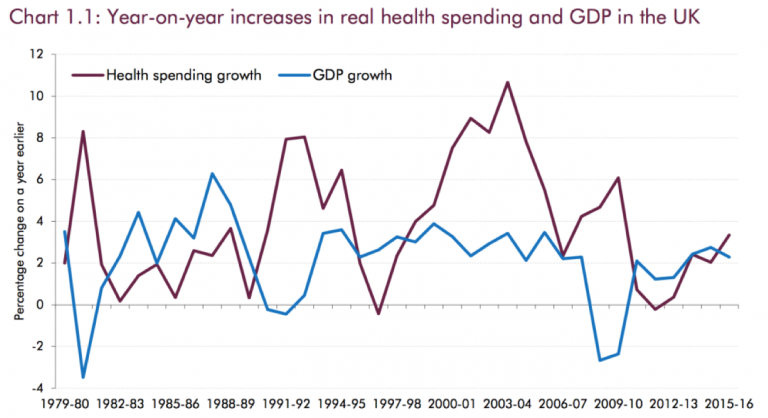The Conservative Party is riding high in the polls despite widespread gloom over the prospects for public services. The Party’s electoral vulnerability on the health service creates an interest on the part of the NHS and its political opponents to declare a “crisis” at every opportunity and during every election. Even during periods of sustained austerity, as now and as in the 1970s, the NHS operates on the well-founded belief that bust will be followed by boom. It is hardly surprising that the intrinsic urge to innovate is weak. The promise of “reform” is taken as a threat, not an opportunity. The political debate reverts time and again to funding. The inevitable result is a disastrous financial rollercoaster. It is time to bring an end to this nonsense and recognise the reality of health spending.
The Guillebaud Report of 1956 nailed the myth that demand on health services would decline as population health improved. In 1985 Nick Bosanquet produced a substantive study on health funding showing that an increase of 2% a year was needed just to keep pace with technical advance and demographic change. Nothing has changed. Life expectancy continues to improve and technology continues to expand the range of what is possible to improve quality of life. Meanwhile health spending has defied this logic.

Source: HM Treasury, ONS see here
The consequences of this erratic path are plain.
Firstly, the boom-bust cycle stokes NHS inflation, making many of the declared crises very real. Booms inflate costs as the service tries to catch up on the recent past. This is most evident in the workforce, which is the majority cost of a health system. There is an inevitable and urgent attempt to boost pay after periods of freezes and to boost staff numbers after recruitment clamps. The tragedy of Mid-Staffordshire bears human testimony to this awful cycle. The inflated workforce costs, that are essential to repair damage done, are carried for many years to come – not just in the active workforce but also in pension costs.
Secondly, the rollercoaster makes real innovation almost impossible. No organisation can invest the time and energy in reform if it expects its resources to randomly boom or bust. It will simply survive in anticipation of the next bail-out. This bias against change is made worse by the stark divide between health and social care. Their funding cycles are unsynchronised, leading to institutionalised distrust and protectionism.
Debates about funding systems and structural reform are simply a diversion from recognition of the fundamental truth of health and social care spending. As a pragmatist rather than an ideologue, Theresa May should be capable of confronting the core problem facing our care system.
Since the creation of the NHS the average annual real-terms increase in spending has been 3.7%, but with erratic and dramatic variation around this average. As in the 1970s, the current average is closer to 1%. One simple but effective policy change would be to amend the NHS Constitution to create a firm commitment to a target range for health and social care annual spending growth. This should be based around Bosanquet’s 2% doctrine. Just as the Bank of England is set a clear 2% target for inflation, so the Treasury itself should face significant hurdles if its plans break firm upper and lower limits for NHS inflation around the target.
Of course, such special treatment for the NHS can generate, quite illogically, spending cuts for social care. The Government must continue with its existing commitment to reform social care funding. A cap on the individual costs of social care for the unfortunate few in this lottery, would enable a clear commitment to stable state funding for the future and create a foundation for private innovation in financing and care delivery.
Every General Election is about the NHS. It is simply an area in which there is a clear divide of party perceptions. In 2017 the election takes place at a time when NHS providers are reporting unprecedented deficits, and the social care system is in a real crisis. The Conservative manifesto will need to address these head on. Replacing the “triple lock” with a constitutional pledge to health and social care would demonstrate a real commitment to fairness over political games.
This first appeared on the British Politics and Policy blog
